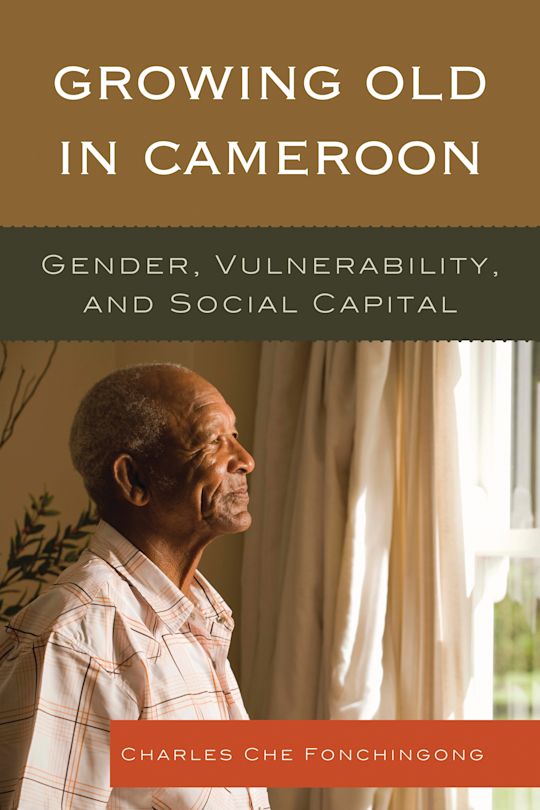This product is usually dispatched within 2-4 weeks
- Delivery and returns info
-
Flat rate of $10.00 for shipping anywhere in Australia
Description
For the governments of many developing African nations, providing income security for the older population is difficult, particularly in Cameroon. This book uncovers the complex problem of pension deficits and difficulties providing welfare and other forms of social assistance. A vast majority of older people in Cameroon remain unassisted and battling to survive, with increasingly fragmented family and community oriented forms of support. As the older population increases, fundamental concerns remain: Is care provided only by family members sustainable? How does gender factor into this situation, and who bears the brunt of these problems? Borrowing from social capital theory, this book discusses how older people struggle to find new forms of social protection.
This book articulates the view that older people display remarkable courage, resilience, and coping strategies which make them not a burden to society, but rather key players in the development process. It proposes achievable policy options that can make a difference in the lives of Cameroon’s older citizens.
Table of Contents
Preface
Acknowledgements
Chapter One: Introduction, Context, and Background
1.0 Introduction
1.1 Inadequacies of Current Literature and New Dimension of the Research
1.2 Statement of the Research Problem
1.3 Research Questions and Specific Objectives
Chapter Two: Theoretical Considerations
2.0 Introduction
2.1 Downside of Colonialism and Alternative Theoretical Frameworks
2.2 Old Age, Poverty, and Re-appraising the Role of the State in Social Policy
2.3 The Concept of Social Security and Social Protection
2.4 Conceptualising Social Capital and Collective Agency
2.5 Feminist Critiques on the Welfare State and Women’s Subordination
Chapter Three: Social Security and the African Perspective
3.0 Introduction
3.1 Social Protection and Traditional Support Mechanisms
3.2 Mapping the Social Security Institutions and Protection Policies in Africa
Chapter Four: Social Security and Elderly Welfare Support in Cameroon
4.0 Introduction
4.1 History, Economic Perspective, and Political Conditions
4.2 Ageing and Social Security in Cameroon
4.3 Administration and Social Security Regime in Cameroon
4.4 Pitfalls of Cameroon’s Social Security System
4.5 Alternative Forms of Reciprocity, Mutual Support, and Social Security
Chapter Five: Gender Dynamics of Population Ageing
5.0 Introduction
5.1 An Overview of Gender and Ageing in Africa
5.2 Socio-Economic Perspectives on Gender and Ageing
5.3 Women, Widowhood, and Ageing
5.4 Bringing Men into the Discourse on Ageing
5.5 Situating the Debate on Gender and Formal Social Security
5.6 Gender Concerns and Informal Social Security Arrangements
Chapter Six: Research Methods
6.0 Introduction
6.1 Period of Research
6.2 Location of the Research
6.3 Sample and Sampling Frame
6.4 Conduct of Interviews
6.5 Participant Observation
6.6 Focus Group Discussion
6.7 Data Analysis
Chapter Seven: Data Analysis, Presentation of Findings, and Field Results
7.0 Introduction
7.1 Socio-Demographic Variables
7.2 Conclusion
Chapter Eight: Older People’s Narratives
8.0 Introduction
8.1 Debunking the Myth of Old People as a Burden
8.2 Cultural Attributes Connected to Old People
8.3 Plight, Coping Mechanisms and Livelihood of Old People in Rural Semi-Urban, and Urban Areas
8.4 Building Social Capital, Forms of Reciprocity, and Networking
8.5 Variations in Levels of Care for Old People and Impact of Remittances
8.6 Old People and the Negotiation of Livelihoods in the Informal Sector
8.7 Kinship-Based and Other Traditional Forms of Support
8.8 Faith-Based Support for Old People
8.9 Elder abuse and Forms of Disrespect
8.10 Redressing the Plight of the Elderly: Viewpoints and Suggestions from Interviewees Themselves
8.11 Dilemma of Widows and Widowers
Chapter Nine: Filling the Gaps: Building Social Capital and Semi-formal Protection Schemes
9.0 Introduction
9.1 Mutual Societies and Social Protection
9.2 Police Wives Social Group-GMI/G Bamenda
9.3 Njangis and Semi-formal Coverage: Case of Wimbum Women’s and Men’s Njangi
9.4 Semi-Formal Protection within Professional Corps: Cameroon Teachers Trade Union and Secondary Education Teachers Socials
9.5 Faith-based Organizations and Social Protection: Case of the Christian Women’s Fellowship and Muslim Religion
9.6 Village-based Organizations and Social Protection: Mbororo Social, Cultural, and Development Association and Wimbum Cultural and Development Association
9.7 Conclusion
Chapter 10: Conclusion, Social Policy Implications, and Recommendations
10.0 Introduction
10.1 Conclusion
10.2 Social Policy Implications and Recommendations
Bibliography
Product details
| Published | 11 Dec 2013 |
|---|---|
| Format | Paperback |
| Edition | 1st |
| Extent | 258 |
| ISBN | 9780761861256 |
| Imprint | University Press of America |
| Illustrations | 2 BW Illustrations, 33 Tables |
| Dimensions | 226 x 151 mm |
| Publisher | Bloomsbury Publishing |



































